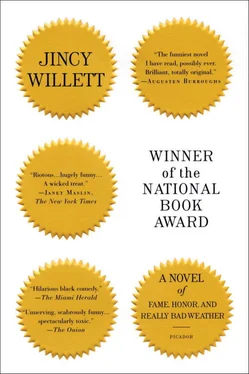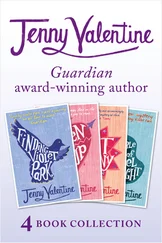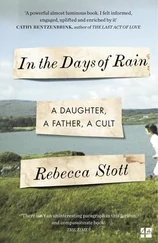We sat on the couch on either side of Father while he told us about our wombs and the little nests our bodies would soon begin to build and then discard. My mind kept wandering. I would have missed the whole thing except that Abigail’s attention was so thoroughly engaged that I couldn’t help homing in from time to time. She never took her eyes off the diagram and our father’s hands elaborating, shading. Her mouth hung open and she kept forgetting to breathe out, just like a three-year-old child, so that his lecture was punctuated by her explosive little sighs. She was rapt. “This is the egg chamber,” our father said, “and this is the long passageway leading from that chamber to the Great Hall…”
I don’t know. Maybe he didn’t actually say this. The way I remember it now, he spoke, really, to Abigail, while I hung around and eavesdropped in a desultory way. But that is unfair and, I believe, untrue. I believe he addressed us both, and turned to me as often as to my sister. Both our parents were scrupulous in the division of their attention. But of course he was really, really speaking only to her.
And she was listening as intently as a son would have listened to his father explain, for the first time, the mechanics of the rifle. Today we have naming of parts…
Not that it matters in the least, but I got mine first. I hid it from Abigail for three months. I don’t know why I did that. Partly self-protection, I suppose, because I expected her to be jealous and angry; partly the pleasure of secrecy, or, I should say, a twin’s pleasure in secrecy. Something you have to be a twin to appreciate.
When she found out about it she behaved, briefly and strangely, like a handmaiden, honoring me for it, and expecting me to honor myself. She ran and told Mother. I think she hoped we would hold some sort of ceremony. “Well,” Mother said, looking at me, smiling. “Dorcas is a woman now.”
“I am not,” I said.
“You are too,” Abigail said.
“No I’m not.” I was still small—I hadn’t begun to get my height yet—and scrawny. I didn’t even look like a girl, much less like a woman. I looked like a child, which is what I was, and knew it well. My body was built for running and climbing, not for having babies.
Abigail, in contrast, looked ripe when she was green. She was taller than me by a head and outweighed me by twenty pounds. At ten she was as moist and plump and dimpled as she had been as a baby; as she has been all her life. She still used baby talc. She still does. She has always had a baby smell, a sweet and intoxicating scent that makes you yearn, in an immediate, objectless way, and underneath the sweetness you detect the sour; and over the years the sourness grew more complex, jungly, powerful, and the sweetness stayed the same.
At ten she had the breasts of a plump man. You could tell they wanted to be real breasts, and would become real breasts if given half a chance. Mine were just pink disks stuck on a bony little chest, with no promise or inclination to become anything more. They looked like the suction cups of two toy arrows.
As to how I felt about this, I felt very little. I didn’t dread “becoming a woman.” I expected it to happen. But somehow it just didn’t seem very important. To put it baldly, I felt, and was, redundant.
But not sad, or left behind. Having Abigail for a sister made my “becoming a woman” unnecessary . Not impossible: just unnecessary. I could not have become Abigail’s sort of woman, but, after all, there are other sorts of women. Stella Mylonas, the chocolate-haired girl, was going to be a woman, and she was lithe and watchful, like a deer, and a sprinter, and the boys loved her. She got all the valentines in the Valentine Box. Abigail actually got very few. Stella had a collection of toy horses, wooden, plastic, bronze. Stella would be a beautiful woman. (I was wrong about this. She became a nice-looking woman with a trim figure. She was beautiful only as a child.)
And there were other girls, not pretty like Stella, but plump like my sister, who did not, like my sister, look purely functional ; who were able to blush and giggle around boys, and give off their own weak, intermittent signals, and still operate on some level apart from the sexual. They were going to be women too.
But not like Abigail.
Chapter Four
The Universal Choking Sign

Chapter 4
Jabez
By the standards of their day, Mathilda Wallace Mather and Jabez Mather had an excellent marriage. Jabez was a “devoted family man,” which is to say that when he wasn’t working he was at home, with his family. There is no evidence that he was ever unfaithful to Mattie, or literally [!!!!!!!!] abusive to his daughters. Visitors to the Mather bungalow must have envied this happy man, the “king of the castle,” the object of devotion for no fewer than three females. “The sun rose and set on my father,” Abigail says now.
—————
I’m going to skip the next few pages. Clearly Hilda is about to depict our father as some kind of pampered, vaguely perverted, pleasure-swollen sultan, lolling and rolling about on tasseled hassocks while “no fewer than three females” scurry through the “bungalow” fetching sweetmeats and aphrodisiacs. With all the inevitable tragic results .
Our father worked for the northeastern division of International Bean. He stocked the grocery shelves of Rhode Island and southeastern Massachusetts with bags of dried legumes. He was able, just, to make a living this way. At least one meal per week was meatless, and centered around a vat of some kind of pasty goop. We ate them all, since we got them for free: lentils, navy beans, great northern whites, limas, chickpeas. Mother did her best, but to this day neither Abigail nor I can bear to take our protein in this form.
I think Father enjoyed spending fifty hours a week pushing dried legumes just about as much as most reasonably bright people would. To compensate, he became a dedicated, though fickle, hobbyist. Over the years, and without discipline or any kind of overall plan, he educated himself (with the inevitable tragic results ). He got on what Mother called “kicks.”
He was a gardener of erratic brilliance, working pitiful wonders with the tiny bit of land we had, and the miserable Yankee soil. One of his longest kicks was rose-grafting. He tried to perfect a new rose for each of us—a “Mattie-Lou,” a miniature “Baby Pilgrim” for me, a “Honeysuckle” for Abigail (respectively scarlet, blue-tinged white, and coral, as I recall)—but he never could sell the AARS judges on any of them. They were always, in my opinion, beautifully shaped, but they would fall short in “vigor” or “foliage” or succumb at the last prequalifying moment to some ignoble disease. Abigail’s rose, the biggest and loveliest of all, had none of these flaws, but gave off an offensive perfume, a cloying, hypocritical scent. It smelled like a cologne-drenched Bourbon princess six months after her last bath.
He would get on reading kicks, bingeing on one subject, reading everything he could get his hands on about it, like the Boer War or the Roman aqueducts or the Gadsden Purchase, and for weeks he would talk of nothing else, until, inexplicably, he would stop talking about it altogether.
I remember him telling Mother about the Battle of Rorke’s Drift. I must have been pretty young at the time, because I got the impression that he was reporting to her the events of his working day, during which a handful of stalwart English troops, commanded by an engineer, held off an army of warring Zulus. This wasn’t pure naïveté on my part, for there really was an immediacy to his prandial book reports, such were his excitement and enthusiasm. I think now that he was as suggestible to books as a hypnotized subject, so eager was he to be taken out of his humdrum life.
Читать дальше













